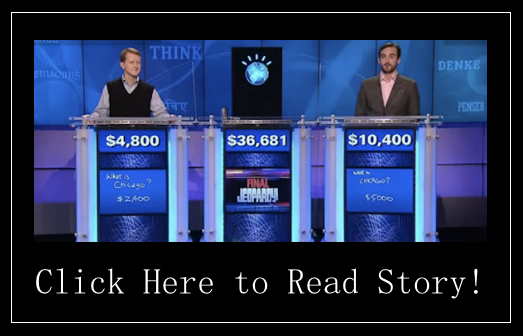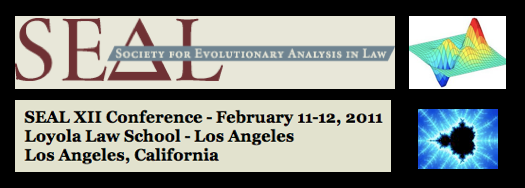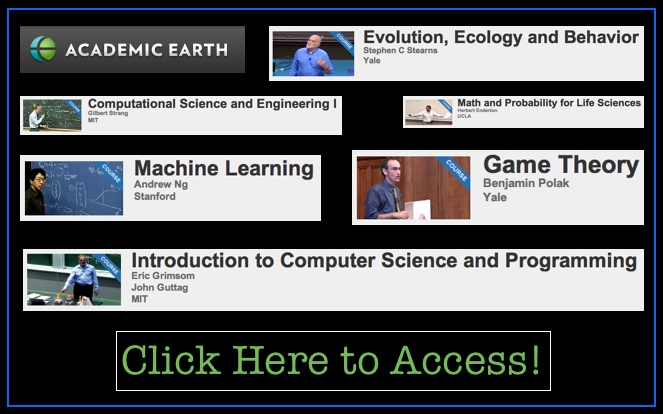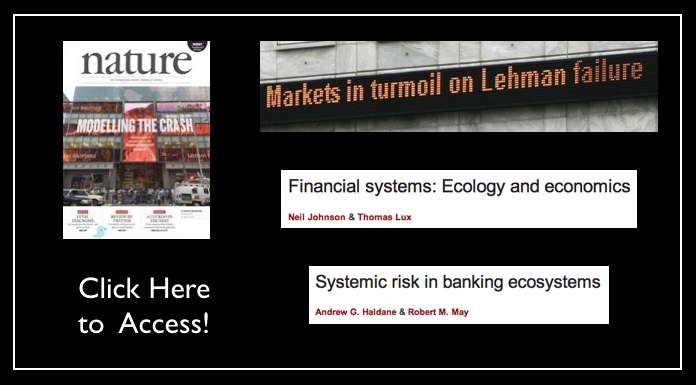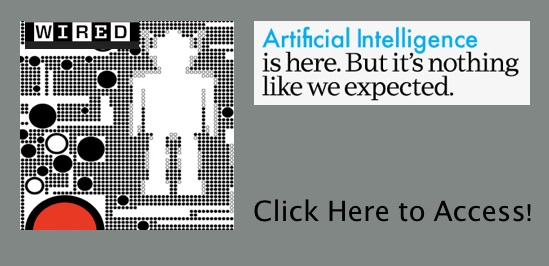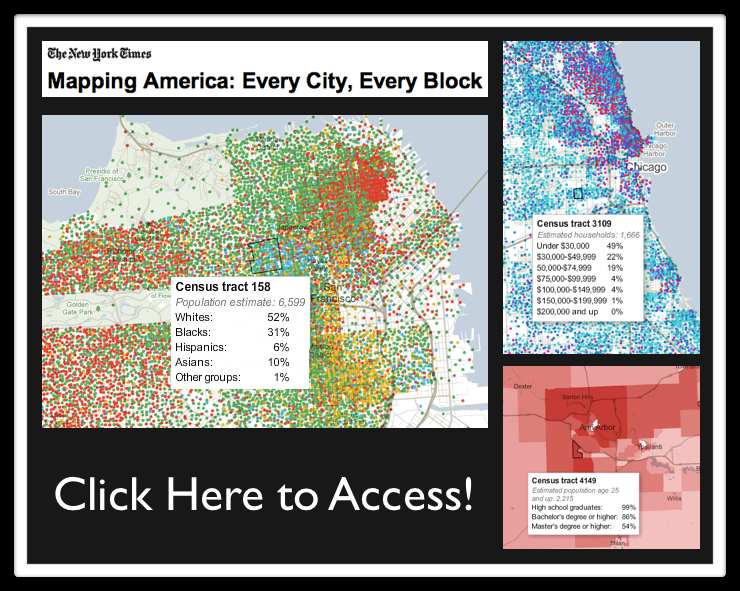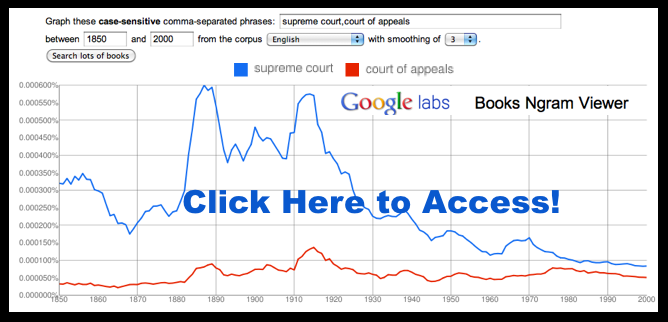Update: For his thoughts on possible implications in the market for legal services, check out Larry Ribstein’s post “Lawyer’s in Jeopardy” over at Truth on the Market. In a related vein, check out today’s WSJ Is Your Job an Endangered Species? The subtitle reads: “Technology is eating jobs—and not just obvious ones like toll takers and phone operators. Lawyers and doctors are at risk as well.”
–
Academic Universe: University Instruction from Some of the World’s Top Scholars
I have been a huge fan of Academic Earth for quite some time. For those not familiar with the page, I wanted to highlight some of my favorite material from the site. Academic Earth features full length video for a number of useful/interesting courses. If you simply are interested in absorbing the content, it is a great way to learn. It is arguably better than site such as MIT Opencourseware as it has the full video (MIT Opencourseware often just has lecture notes).
Thomas Goetz: It’s Time to Redesign Medical Data [TEDMed]
Modeling the Financial Crisis [ From Nature ]
This week’s issue of Nature offers two brief but meaningful articles on the financial crisis. Here are the abstracts:
Financial Systems: Ecology and Economics (By Neil Johnson & Thomas Lux): “In the run-up to the recent financial crisis, an increasingly elaborate set of financial instruments emerged, intended to optimize returns to individual institutions with seemingly minimal risk. Essentially no attention was given to their possible effects on the stability of the system as a whole. Drawing analogies with the dynamics of ecological food webs and with networks within which infectious diseases spread, we explore the interplay between complexity and stability in deliberately simplified models of financial networks. We suggest some policy lessons that can be drawn from such models, with the explicit aim of minimizing systemic risk.”
Systemic Risk in Banking Ecosystems (By Andrew G. Haldane & Robert M. May): “In the run-up to the recent financial crisis, an increasingly elaborate set of financial instruments emerged, intended to optimize returns to individual institutions with seemingly minimal risk. Essentially no attention was given to their possible effects on the stability of the system as a whole. Drawing analogies with the dynamics of ecological food webs and with networks within which infectious diseases spread, we explore the interplay between complexity and stability in deliberately simplified models of financial networks. We suggest some policy lessons that can be drawn from such models, with the explicit aim of minimizing systemic risk.”
The Future of Computational Social Science @ University of Washington – Submissions Due Jan. 30, 2011
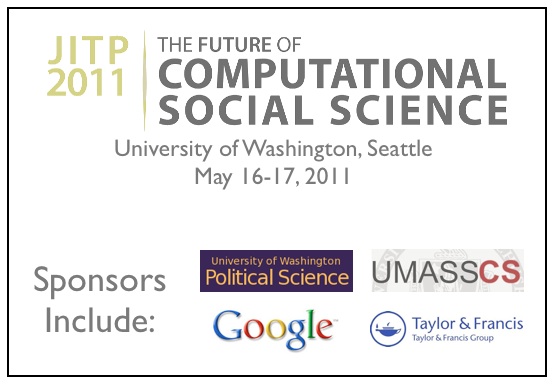 As a member of the conference program committee, I would like encourage you to consider submitting a paper to “The Future of Computational Social Science” at the University of Washington – Seattle, May 16-17, 2011. The conference aims to bring together leaders from industry and the academy to present cutting edge work. For those who might be interested in attending, please click on the image above or here to access the call for papers. Here is an excerpt:
As a member of the conference program committee, I would like encourage you to consider submitting a paper to “The Future of Computational Social Science” at the University of Washington – Seattle, May 16-17, 2011. The conference aims to bring together leaders from industry and the academy to present cutting edge work. For those who might be interested in attending, please click on the image above or here to access the call for papers. Here is an excerpt:
“Computational social science is an emergent field and source of new theoretical and methodological innovation for social science more broadly. Multidisciplinary teams of social and computer scientists are increasingly common in the lab and at workshops where cross-fertilization occurs in the areas of theory, data, methods, and tools. Peer-reviewed interdisciplinary work is becoming more common as the computational tools and techniques of computer science are being used by social scientists. Previously, large-scale computational processing was the purview of expensive, university-centric computing labs. Now, with the democratization of technology, universities and for-profit firms increasingly provide large amounts of inexpensive computing power to researchers and citizens alike.”
Authors are invited to prepare and submit to JITP a research paper, policy viewpoint, workbench note, or teaching innovation manuscript by January 30, 2011. There is also an option to submit an abstract for potential inclusion in the poster session. The poster abstract is also due January 30, 2011.
Yesterday’s Fast is Today’s Slow – The 2011 Season Starts Today!
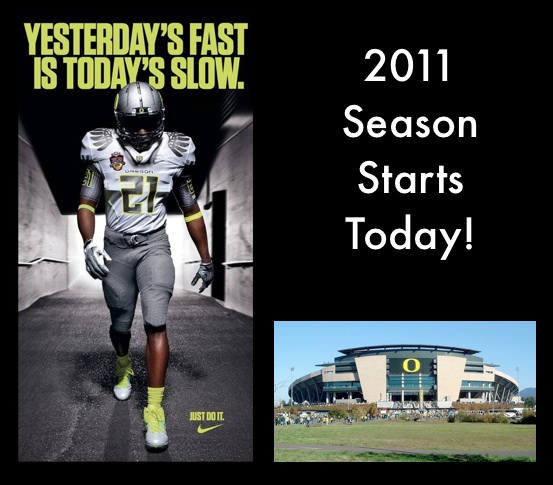
Well my Ducks did not quite get it done last night in the BCS National Championship Game. Despite the loss, I think that it is important to emphasize that innovation on a variety of fronts is responsible for bringing Oregon to the title game. Simply put, Oregon has redefined the game and there is no doubt that copycats will soon begin to follow their model. The Ducks still have one more big step to take but they will be one of the favorites in 2011 — that season begins today.
The AI Revolution Is On [ Via Wired Magazine ]
From the Full Article: “AI researchers began to devise a raft of new techniques that were decidedly not modeled on human intelligence. By using probability-based algorithms to derive meaning from huge amounts of data, researchers discovered that they didn’t need to teach a computer how to accomplish a task; they could just show it what people did and let the machine figure out how to emulate that behavior under similar circumstances. … They don’t possess anything like human intelligence and certainly couldn’t pass a Turing test. But they represent a new forefront in the field of artificial intelligence. Today’s AI doesn’t try to re-create the brain. Instead, it uses machine learning, massive data sets, sophisticated sensors, and clever algorithms to master discrete tasks. Examples can be found everywhere …”
Humanities in the Digital Age [Via MIT World]
About the Lecture: “Reports of the demise of the humanities are exaggerated, suggest these panelists, but there may be reason to fear its loss of relevance. Three scholars whose work touches a variety of disciplines and with wide knowledge of the worlds of academia and publishing ponder the meaning and mission of the humanities in the digital age. Getting a handle on the term itself proves somewhat elusive. Alison Byerly invokes those fields involved with “pondering the deep questions of humanity,” such as languages, the arts, literature, philosophy and religion. Steven Pinker boils it down to “the study of the products of the human mind.” Moderator David Thorburn wonders if the humanities are those endeavors that rely on interpretive rather than empirical research, but both panelists vigorously make the case that the liberal arts offer increasing opportunities for data-based analysis.
Technology is opening up new avenues for humanities scholars. In general, Byerly notes, humanities “tend to privilege individual texts or products of the human mind, rather than collective wisdom or data.” More recently, online collections or data bases of text, art and music make possible wholly different frameworks for study.
Humanists are adopting new tools and methods for teaching and publishing as well. As Pinker notes, the process for publishing articles in scholarly journals remains painfully slow: in experimental psychology, a “six year lag from having an idea to seeing it in print.” He suggests a “second look” at the process of peer review, perhaps publishing everything online, “and stuff that’s crummy sinks to the bottom as no one links to or reads it.” Pinker looks forward to a future where he no longer has to spend a “lot of time leafing through thick books” looking for text strings, or flipping to and from footnotes. “We could love books as much as we always have, but not necessarily confine ourselves to their limitations, which are just historical artifacts,” he says.”
Some Papers We Have Been Reading & Final Post of 2010

A Plea for More Aggregation: The Looming Threat to Empirical Legal Scholarship (By John Pfaff)
The Microstructure of the ‘Flash Crash’: Flow Toxicity, Liquidity Crashes and the Probability of Informed Trading (By David Easley, Marcos Mailoc Lopez de Pardo & Maureen O’Hara)
The Death of Big Law (By Larry Ribstein)
Justices and Legal Clarity: Analyzing the Complexity of Supreme Court Opinions (By Ryan Owens and Justin Wedeking)
Citizens United and the Illusion of Coherence (By Richard Hasen)
Gaming the Past: The Theory and Practice of Historic Baselines in the Administrative State (By J.B. Ruhl & James Salzman)
On the Origins of Western Law and Western Civilization (in the Indus Valley) (By Robin Kar)
What is Law? A Coordination Model of the Characteristics of Legal Order (By Gilian Hadfield and Barry Weingast)
Who Speaks for Science? A Response to the National Academy of Sciences Report on Forensic Science (By Simon Cole)
What Do Federal District Judges Want? An Analysis of Publications, Citations, and Reversals (By Stephen Choi, Mitu Gulati & Eric Posner)
The Wages of Stealth Overruling (With Particular Attention to Miranda v. Arizona) (By Barry Friedman)
Frames of Injustice: The Bias We Overlook (By Adam Benforado)
Citations in the U.S. Supreme Court: An Empirical Study of their Use and Significance (By Frank Cross, James Spriggs, Timothy Johnson & Paul Wahlbeck)
Google Ngram Viewer [From Google Labs]
Leveraging the Google Books corpus, Google has released the Google N Gram viewer. There is coverage all over the web … but here is just few articles: (NY Times) (Mother Jones) (Scientific American) (Boston.com). It is also possible to download the underlying data. For additional information, click here to access the about page. Very cool stuff!
While Google Ngrams is a fun exploratory tool, it is merely a glimpse at the real possibilities in the era of Big Data. Two major conferences this year — Princeton CITP: Big Data Conference and ECCS 2010: High Throughput Humanities offered a preview of the world that is coming. In my presentation at these conferences, I tried to underscore the ways in which these developments are meaningful for social scientists, legal scholars and practicing lawyers. In short, the prospects for arbitrage here are significant. It will be exciting to watch creative folks try to put things together …

